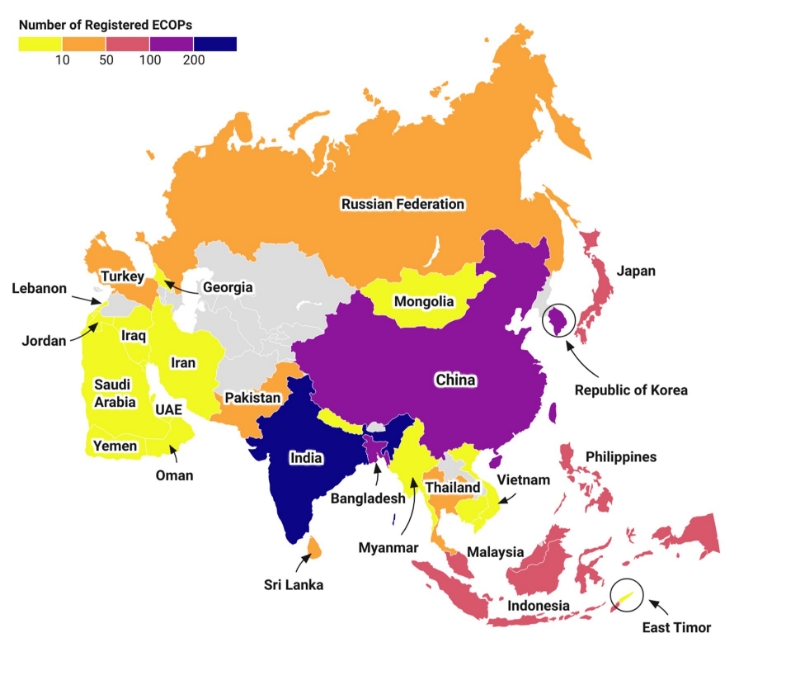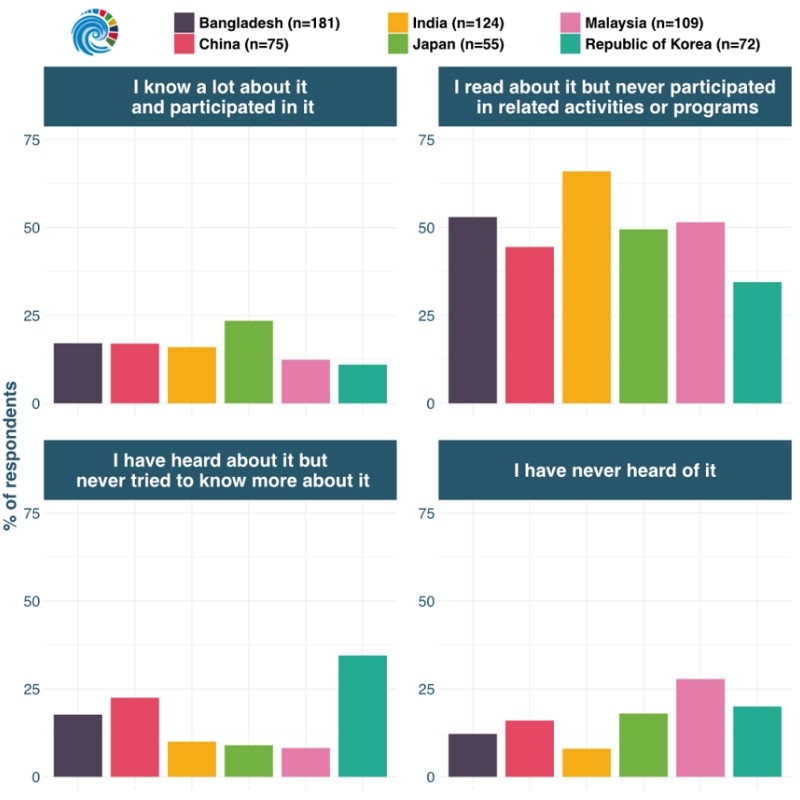Ocean Newsletter
No.580 October 5, 2024
-
Mainstreaming and Embracing Meaningful Engagement of Early Career Ocean Professionals (ECOP) in Asia
Raphael Roman (Consultant and ECOP Asia Coordinator, Intergovernmental Oceanographic Commission of UNESCO (IOC-UNESCO))
Since its endorsement as a global network Programme of the United Nations Decade of Ocean Science for Sustainable Development (“UN Ocean Decade”) in June 2021, the ECOP Programme has rapidly expanded and diversified its reach. As of May 2024, it comprises 5 regional nodes and more than 40 national hubs worldwide, including ECOP Japan. Over 1,100 ECOPs have joined the Asia network, which aims to address identified challenges such as limited funding, insufficient training opportunities, and a lack of community belonging. Empowering ECOPs and enhancing their engagement, participation, and leadership within the UN Ocean Decade and other international policy frameworks remain top priorities for the ECOP Asia node. In Japan, recent leadership developments may inspire and facilitate Japanese ECOPs' contribution to international and transdisciplinary marine science collaborations.
-
Trajectory of UN Ocean Decade and ECOP’s Role as Depicted by the Barcelona Conference
TANAKA Kotaro (Research Fellow, Ocean Policy Research Institute of the Sasakawa Peace Foundation, ECOP Japan Coordinator)
In April 2024, after the first three years of the United Nations Decade of Ocean Science, the 2024 Ocean Decade Conference was held in Barcelona, Spain, as its first face-to-face meeting. Participants shared their visions and challenges, and the conference highlighted the progress made so far, such as an increase in the diversity of participants' backgrounds and sectors, as well as in highlighting Early Career Ocean Professionals (ECOPs). On the other hand, challenges remain, including participation and contributions from Asia, or more specifically, Japan. Actions toward “no one left behind,” which is supported by the momentum and network of ECOPs, is expected.
-
Towards the Realization of an "Ocean that Everyone can Safely Enjoy"
UENO Ryo (Business Strategy Office, Japan Lifesaving Association)
In "safe oceans," one of the themes of the "United Nations Decade of Ocean Science," we propose the need for initiatives to prevent accidents among increasingly diverse and year-round beach users and for drowning prevention awareness-raising through collaboration between industry, government, and academia, based on international trends in drowning prevention and the current domestic situation.
Mainstreaming and Embracing Meaningful Engagement of Early Career Ocean Professionals (ECOP) in Asia
KEYWORDS
United Nations Decade of Ocean Science for Sustainable Development (UN Ocean Decade) /ECOP /ocean literacy
Raphael Roman (Consultant and ECOP Asia Coordinator, Intergovernmental Oceanographic Commission of UNESCO (IOC-UNESCO))
Since its endorsement as a global network Programme of the United Nations Decade of Ocean Science for Sustainable Development (“UN Ocean Decade”) in June 2021, the ECOP Programme has rapidly expanded and diversified its reach. As of May 2024, it comprises 5 regional nodes and more than 40 national hubs worldwide, including ECOP Japan. Over 1,100 ECOPs have joined the Asia network, which aims to address identified challenges such as limited funding, insufficient training opportunities, and a lack of community belonging. Empowering ECOPs and enhancing their engagement, participation, and leadership within the UN Ocean Decade and other international policy frameworks remain top priorities for the ECOP Asia node. In Japan, recent leadership developments may inspire and facilitate Japanese ECOPs' contribution to international and transdisciplinary marine science collaborations.
Evolution and Progress of the Regional ECOP Node for Asia (2021-2024)
Spanning from the Middle East to Japan and Indonesia, the regional node of the ECOP Programme for Asia (“ECOP Asia”) aims to nurture, support, and connect a diverse network of early-career individuals passionate about ocean sustainability and marine conservation. This interdisciplinary community includes students, academic researchers, divers, fishers, government scientists, school teachers, lawyers, coastal community leaders, NGO members, entrepreneurs, and beach clean-up volunteers. The goal is to foster engagement, inclusivity, knowledge exchange, capacity sharing, action, and leadership among Asian ECOPs, creating a vibrant and interconnected community that is collectively committed to addressing the challenges facing our ocean.
Gathering around 230 ECOPs from 25 countries in April 2022, the ECOP Asia membership base has grown nearly fivefold in two years, reaching 1,100 ECOPs from 35 different countries. While representation gaps remain in Central, West, and parts of Southeast Asia, large ECOP audiences are concentrated in India (282), China (172), the Republic of Korea (116), Bangladesh (104), and Malaysia (80). In total, 65 Japanese ECOPs are part of the regional network.
Some national ECOP communities have already organized themselves and launched their own hub or node, including ECOP Japan, ECOP Korea, and ECOP China. Others are currently in the process of doing so in Bangladesh, India, Malaysia, Thailand, Lebanon, and the Philippines. ECOP Asia is also welcoming working group proposals on themes and topics of interest to ECOPs in the region. In response to the perceived lack of resources, materials, and networks focusing on Ocean Literacy in Asia, a regional working group was established in September 2023. Its aim is to mainstream ocean literacy across Asia, facilitating collaborations and exchanges across borders while recognizing the need for a blue curriculum and regional network of blue schools.
Gathering around 230 ECOPs from 25 countries in April 2022, the ECOP Asia membership base has grown nearly fivefold in two years, reaching 1,100 ECOPs from 35 different countries. While representation gaps remain in Central, West, and parts of Southeast Asia, large ECOP audiences are concentrated in India (282), China (172), the Republic of Korea (116), Bangladesh (104), and Malaysia (80). In total, 65 Japanese ECOPs are part of the regional network.
Some national ECOP communities have already organized themselves and launched their own hub or node, including ECOP Japan, ECOP Korea, and ECOP China. Others are currently in the process of doing so in Bangladesh, India, Malaysia, Thailand, Lebanon, and the Philippines. ECOP Asia is also welcoming working group proposals on themes and topics of interest to ECOPs in the region. In response to the perceived lack of resources, materials, and networks focusing on Ocean Literacy in Asia, a regional working group was established in September 2023. Its aim is to mainstream ocean literacy across Asia, facilitating collaborations and exchanges across borders while recognizing the need for a blue curriculum and regional network of blue schools.

ECOP Asia Membership Distribution (April 2024) – Created with Datawrapper
Understanding the needs of Asian ECOPs and Building a Sense of Community
Over the past two years, with the support of national ECOP focal points and interns, ECOP Asia conducted seven needs assessment surveys at both regional and national levels. The main purpose of these questionnaires is to enhance our understanding of the needs, priorities, and challenges facing ECOPs across Asia. The feedback and insights gathered help capture cultural nuances and better tailor future action plans and recommendations, particularly regarding ECOP engagement and capacity strengthening. The results from these surveys have been compiled into publicly available, multilingual reports, the latest of which was published by ECOP Japan[1].
Based on these surveys, the most prominent barriers that Asian ECOPs struggle with are: (1) a lack of job opportunities and low salary prospects; (2) insufficient training programs and funding opportunities, notably research grants, scholarships, and conference travel expenses; and (3) limited professional and social networks. ECOP Asia aims to evolve into a dynamic “network of networks”, connecting, supporting, upskilling, and empowering the next generation of ocean leaders, whether they are scientists, policy-makers, fishers, or local grassroots organizers. With an expanding portfolio of diverse ECOP-led activities – such as symposiums, workshops, online training courses, beach clean-ups, and webinars – the ECOP Asia node endeavors to foster a sense of community and ownership among its members and institutional partners.
Based on these surveys, the most prominent barriers that Asian ECOPs struggle with are: (1) a lack of job opportunities and low salary prospects; (2) insufficient training programs and funding opportunities, notably research grants, scholarships, and conference travel expenses; and (3) limited professional and social networks. ECOP Asia aims to evolve into a dynamic “network of networks”, connecting, supporting, upskilling, and empowering the next generation of ocean leaders, whether they are scientists, policy-makers, fishers, or local grassroots organizers. With an expanding portfolio of diverse ECOP-led activities – such as symposiums, workshops, online training courses, beach clean-ups, and webinars – the ECOP Asia node endeavors to foster a sense of community and ownership among its members and institutional partners.
Addressing the Ocean Decade Engagement Gap in Asia
When asked about their knowledge of the UN Ocean Decade, a significant majority (80%) of Asian ECOPs reported being aware of it. Despite this awareness, over 60% of those familiar with the UN Ocean Decade have not actively engaged in it. Many ECOPs are eager to participate in this global collective effort to sustainably manage the ocean. Now, in its fourth year of implementation, there is a clear opportunity for regional ocean stakeholders to engage talented and motivated ECOPs in meaningful projects and initiatives, while providing mentorship to help advance their careers.

“How much do you know about the UN Decade of Ocean Science for Sustainable Development?” Results derived from the 2023-2024 national ECOP surveys in Asia
Progress of ECOP Japan and Ways Forward
As the first national node in Asia, ECOP Japan has served as a role model for emerging ECOP networks worldwide. ECOP Japan has been particularly active, organizing two successful symposiums in January 2022 (virtual) and March 2024 (in-person), producing seven video interviews[2], and recently releasing a bilingual report. The national team is now expanding, striving to connect with a greater diversity of Japanese ECOPs. They plan to leverage popular communication platforms (e.g., Twitter (X), Instagram and LINE) and focus their outreach on non-academic sectors and ECOPs outside the Tokyo metropolitan area.
With the recent election of Professor Yutaka Michida as the new chairperson of the Intergovernmental Oceanographic Commission of UNESCO[3], Japanese ECOPs have a unique window of opportunity to learn, engage, and contribute to international and transdisciplinary marine science collaborations. The ECOP Japan platform provides an ideal entry point for interested ECOPs to amplify their voices and take part in the UN Ocean Decade, doing so in their own chosen capacity.
With the recent election of Professor Yutaka Michida as the new chairperson of the Intergovernmental Oceanographic Commission of UNESCO[3], Japanese ECOPs have a unique window of opportunity to learn, engage, and contribute to international and transdisciplinary marine science collaborations. The ECOP Japan platform provides an ideal entry point for interested ECOPs to amplify their voices and take part in the UN Ocean Decade, doing so in their own chosen capacity.
[1] Kotaro Tanaka and Yushi Morioka, “ECOP Japan Survey Report 2023: Analysis and Results” (ECOP Reports & Resources, 1 April 2024)
https://www.ecopdecade.org/wp-content/uploads/2024/04/ECOPJapanSurveyReport_Japanese.pdf
[2] Video Letters Playlist: https://www.youtube.com/playlist?list=PLlJVW7Wt8pT776jTUPA_VIRorUoOHsi0l
[3] Mitsutaku Makino, “A New Phase for the Intergovernmental Oceanographic Commission (IOC/UNESCO) and Japan’s Role” (Ocean Newsletter No. 557)
https://www.spf.org/opri/en/newsletter/557_1.html
https://www.ecopdecade.org/wp-content/uploads/2024/04/ECOPJapanSurveyReport_Japanese.pdf
[2] Video Letters Playlist: https://www.youtube.com/playlist?list=PLlJVW7Wt8pT776jTUPA_VIRorUoOHsi0l
[3] Mitsutaku Makino, “A New Phase for the Intergovernmental Oceanographic Commission (IOC/UNESCO) and Japan’s Role” (Ocean Newsletter No. 557)
https://www.spf.org/opri/en/newsletter/557_1.html
